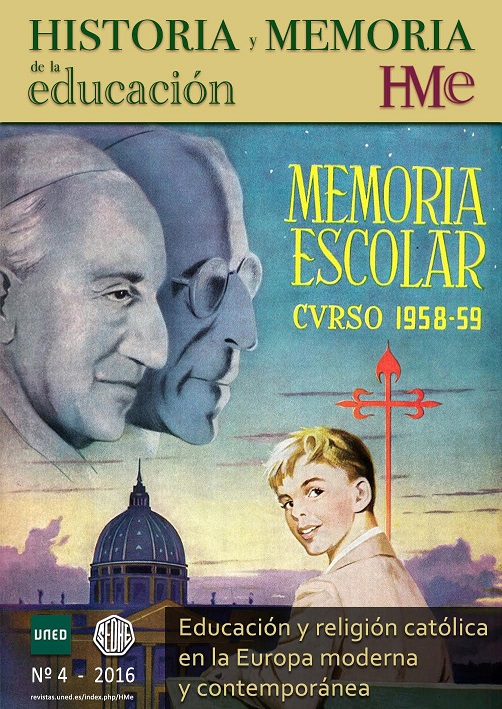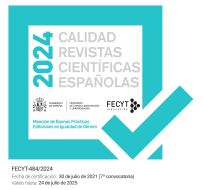Educação e ensino: matérias de concórdia ou disputa entre o Estado e a Igreja Católica durante o regime autoritário português?
DOI:
https://doi.org/10.5944/hme.4.2016.15761Parole chiave:
Política, Religião, Educação, Ensino, PortugalAbstract
Neste artigo, discute-se se as matérias relacionadas com educação e ensino foram objeto de entendimento ou de conflito entre o Estado autoritário e a Igreja Católica em Portugal. Cobre-se o período temporal de toda a ditadura (1933-1974) e analisa-se quer o estatuto conferido à religião no ensino público e estruturas estatais de enquadramento da juventude, quer o regime estabelecido para o ensino particular confessional. Inicia-se a exposição com breve caracterização do que foi o modelo de relacionamento entre o Estado e a instituição eclesial, aqui designado por «segunda separação». Em seguida, procura-se confirmar o quadro traçado, observando os dossiers mais importantes que, no âmbito daquelas «matérias mistas», se colocaram ao Estado e à Igreja Católica: alterações constitucionais relativas aos princípios orientadores do ensino público, afixação de cruxifixos nas escolas, assistência religiosa nas organizações estatais de juventude, situação do ensino privado, criação da Universidade Católica Portuguesa e regulação da incumbência do ensino da moral e da religião. Questionam-se estratégias da governação: definições de agenda política, processos de decisão política e feitura das leis. Exploram-se comportamentos dos agentes eclesiais, apreciando: estratégias compromissórias, de resistência ou de promoção de interesses religiosos e a sua capacidade de influência sobre os decisores políticos.Downloads
Riferimenti bibliografici
Araújo, António de. A Lei de Salazar. Coimbra, Edições Tenacitas, 2007.
Catroga, Fernando. «Secularização e Laicidade. A Separação das Igrejas e da Escola». In História da Escola em Portugal e no Brasil. Circulação e apropriação de modelos culturais, edited by Joaquim Pintassilgo et al.. Lisboa: Edições Colibri/Centro de Investigação em Educação da Faculdade de Ciências da Universidade de Lisboa, 2006.
Cerejeira, Manuel Gonçalves. «Natureza da Acção Católica. Discurso aos assistentes eclesiásticos diocesanos da Acção Católica Portuguesa, segundo as notas tomadas pelo Novidades de 13 de Maio de 1936». In Obras Pastorais. Lisboa: União Gráfica, 1961.
Cotovio, Jorge. O Ensino Privado nas décadas de 50, 60 e 70 do século XX. O contributo das escolas católicas. Coimbra, Gráfica de Coimbra 2, 2012.
Freire, José Geraldes. Resistência Católica ao Salazarismo-Marcelismo. Porto, Telos, 1976.
Kuin, Simon. «Mocidade Portuguesa». In Dicionário de História do Estado Novo, edited by Fernando Rosas and J.M. Brandão de Brito. Lisboa: Círculo de Leitores, 1996.
Moreira, António Montes. «Universidade Católica Portuguesa». In Dicionário de História Religiosa de Portugal, edited by Carlos Moreira Azevedo. Lisboa, Círculo de Leitores, 2001.
Pimentel, Irene Flunser. História das Organizações Femininas do Estado Novo. Lisboa, Temas e Debates, 2001.
Pintassilgo, Joaquim. «Igreja, Estado e Família no debate sobre o ensino particular em Portugal (meados do século XX)». In Estado, Igreja e Educação: o mundo ibero-americano nos séculos XIX e XX, edited by Carlos Henrique de Carvalho e Wenceslau Gonçalves Neto. Campinas, Editora Alínea, 2010.
Santos, Paula Borges. A Questão Religiosa no Parlamento1935-1974. Lisboa, Assembleia da República, 2011.
Valente, Vasco Pulido. «Caetano, Marcelo». In Dicionário de História de Portugal, edited by António Barreto and Maria Filomena Mónica. Porto, Livraria Figueirinhas, 1999.
Vicente, Ana Cláudia. «A introdução do escutismo em Portugal». Lusitania Sacra, 2.ª série, 16 (2004): 232-234.
##submission.downloads##
Pubblicato
Come citare
Fascicolo
Sezione
Licenza
Authors who publish in Historia y Memoria de la Educación agree to the following terms:
- Authors retain copyright and grant the journal right of first publication with the work simultaneously licensed under a Creative Commons Attribution-NonCommercial 4.0 International that allows others to share the work with an acknowledgement of the work's authorship and initial publication in this journal.
- Authors are able to enter into separate, additional contractual arrangements for the non-exclusive distribution of the journal's published version of the work (e.g., post it to an institutional repository or publish it in a book), with an acknowledgement of its initial publication in this journal.
- Authors are permitted and encouraged to post their work online (e.g., in institutional repositories or on their website) prior to and during the submission process, as it can lead to productive exchanges, as well as earlier and greater citation of published work (See The Effect of Open Access).










